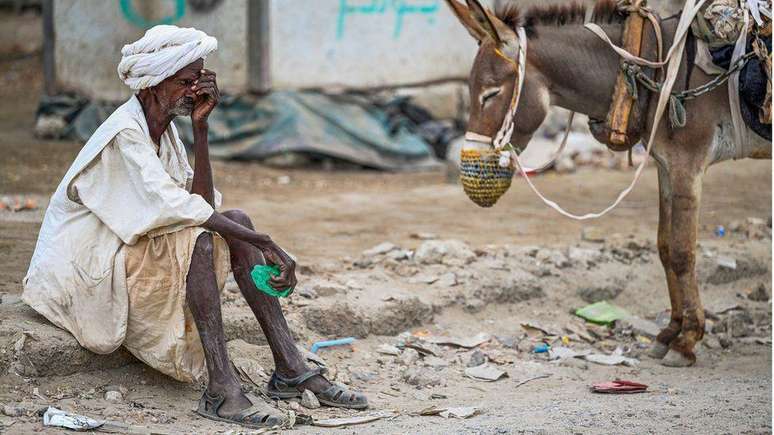While all attention is focused on Gaza, another humanitarian crisis is underway in Sudan, which is approaching a year of civil war.
It’s been a year since conflict broke out between the Sudanese army and the paramilitary group Rapid Support Forces (RSF), plunging the country into civil war.
The violence began in the capital Khartoum and spread throughout the territory, resulting in the deaths of thousands of people, as well as widespread destruction of buildings and infrastructure.
A senior United Nations official told BBC Arabic, the BBC’s Arabic-language news service, that Sudan is on track to become the world’s worst famine crisis.
“We have a catastrophe on our hands and my fear is that it will get even worse,” says Michael Dunford, emergency coordinator for Sudan for the United Nations World Food Program (WFP).
Around 18 million people suffer from “acute hunger” and this number could increase significantly.
Humanitarian aid experts also warn that 220,000 people could die in the coming months.
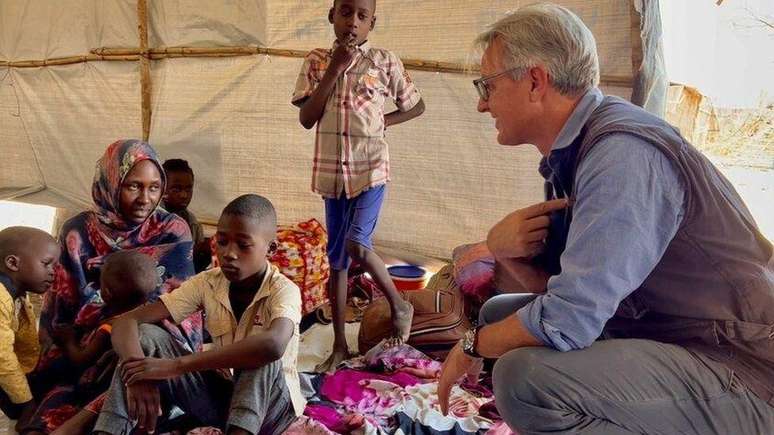
The fighting began on April 15, 2023, when tensions between the country’s army and the RSF, its former ally, burst into the open.
The trigger was an internationally supported political plan to move towards civilian government.
Experts fear that the official UN death toll of nearly 14,000 is too low and that the real number is likely much higher.
More than 8 million people have been forced to leave their homes, many of them displaced within the country, while others have fled across the border to countries neighboring Sudan.
A historic city in ruins
The capital Khartoum, together with the neighboring cities of Omdurman and Bahri, constitute Greater Khartoum. Before the war, over 7 million people lived here.
The RSF controls much of the region, but the army has gone on the attack and recently took control of the state television headquarters in Omdurman.
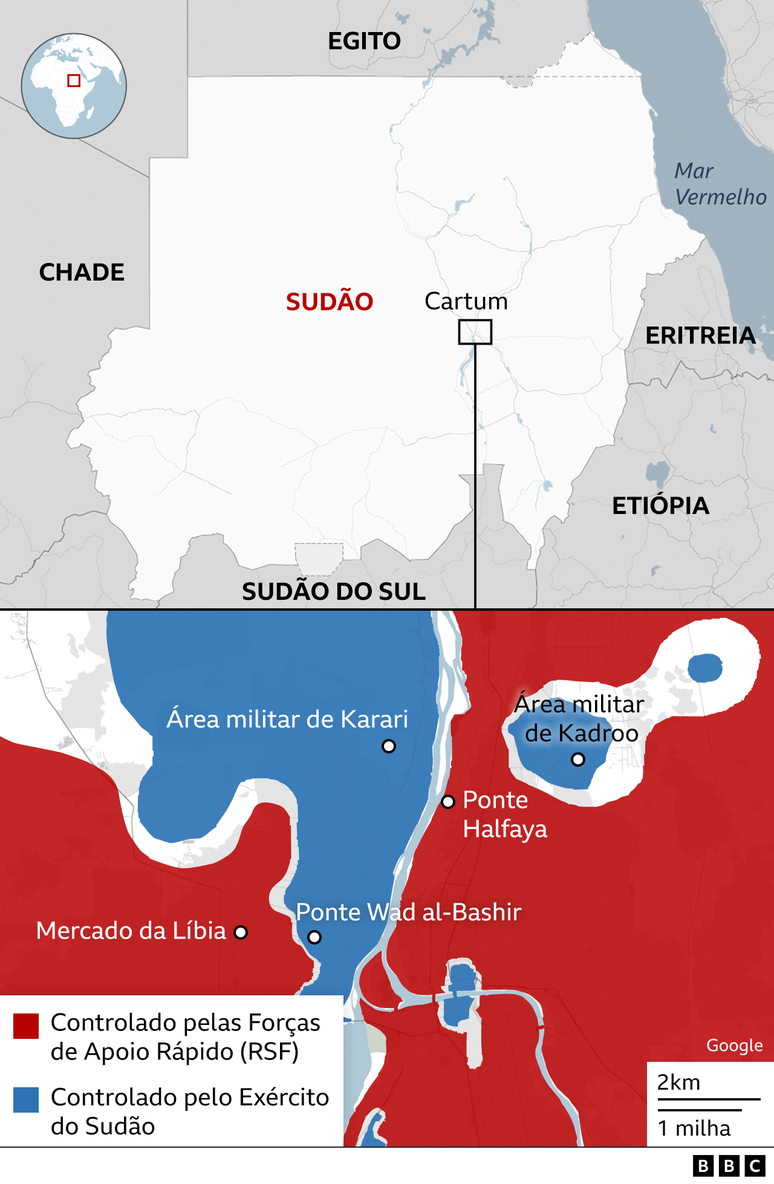
Photos and videos analyzed by BBC Verify, the BBC’s verification service, and BBC Arabic show damage to shops, hospitals, universities and banks.
Among the buildings destroyed is the Greater Nile Petroleum Oil Company Tower, one of the capital’s most iconic skyscrapers, which was consumed by flames in September last year.
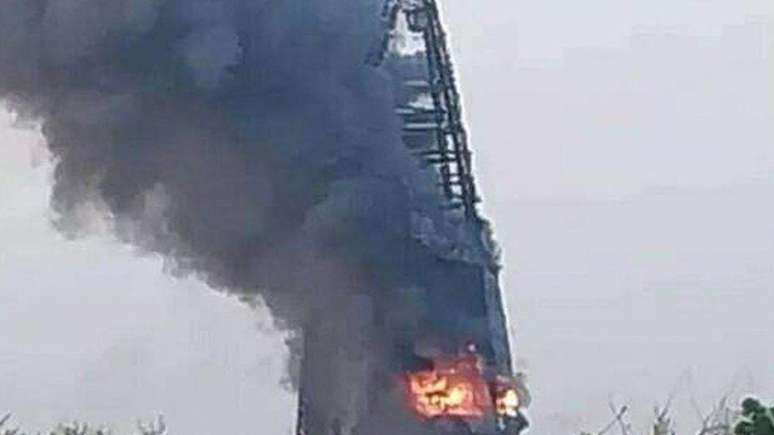
At least three hospitals and a university suffered varying degrees of damage due to the clashes.
Khartoum’s Dr Alaa El-Din El-Nour told BBC Arabic that hospitals were facing a serious shortage of medical supplies.
“We don’t feel safe as doctors. Medical supplies and equipment have also been looted,” he says.
WFP says the destruction of infrastructure is worsening the humanitarian situation.
“It’s escalating levels of food insecurity,” Dunford says.
BBC Verify and BBC Arabic have collected further examples of destruction in Khartoum that are contributing to the humanitarian crisis.
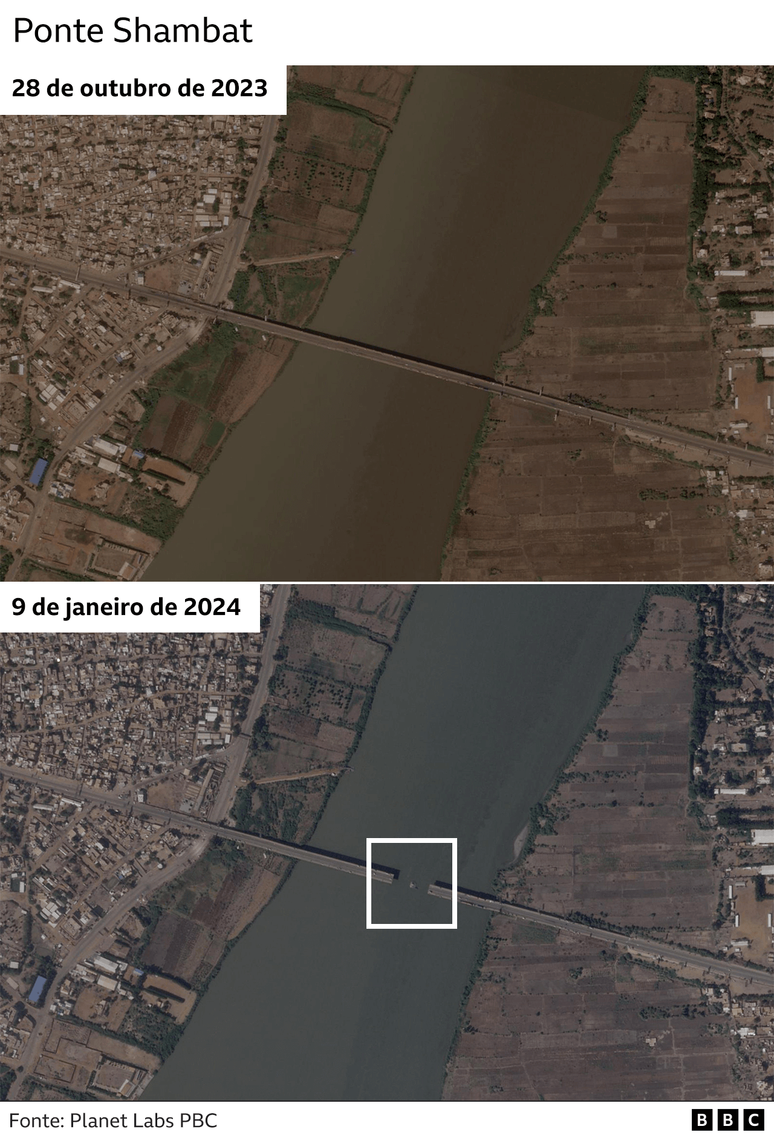
The Shambat Bridge, which connects the cities of Omdurman and Bahri, collapsed in November last year. It was a strategic location for the RSF, which used the facility to move fighters and equipment across the Nile River.
In January, the al-Jaili oil refinery, located north of Khartoum, caught fire after fighting occurred. The structure was at the center of a power struggle between the two warring parties.
Leon Moreland, a researcher at the UK-based Conflict and Environment Observatory, says 32 large storage tanks were damaged in three separate incidents between November 2023 and January this year.
“Oil spills can reach the water table and agricultural areas on the slope towards the Nile without any kind of intervention,” he tells BBC Arabic.
“This new pollution will exacerbate pre-existing soil contamination at the site, which satellite imagery suggests was already extensive.”
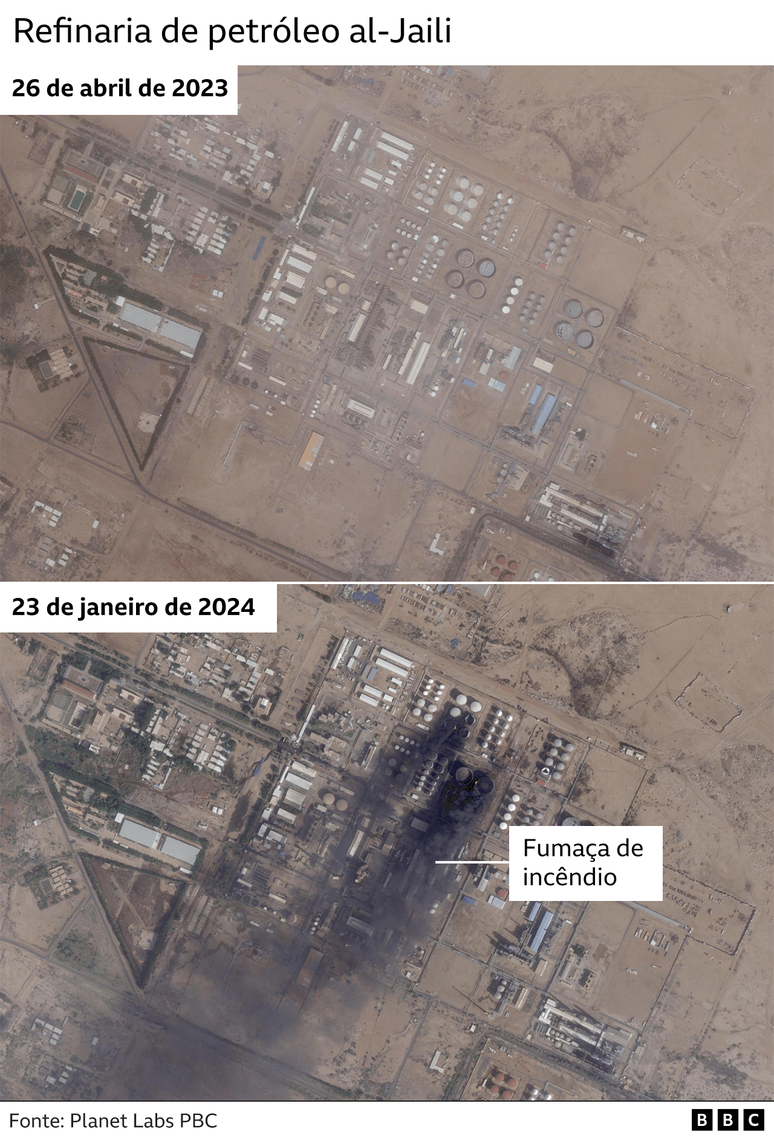
Satellite images also reveal that the tanks of three water pumping stations in Khartoum are empty. It is unclear how this happened.
Hassan Mohammed, a 31-year-old resident of Khartoum, told BBC Arabic that he had suffered from a lack of water and electricity for the past four months.
“We travel long distances to get drinking water or we depend on river water, which is not drinkable, which causes the spread of diseases,” he reports.
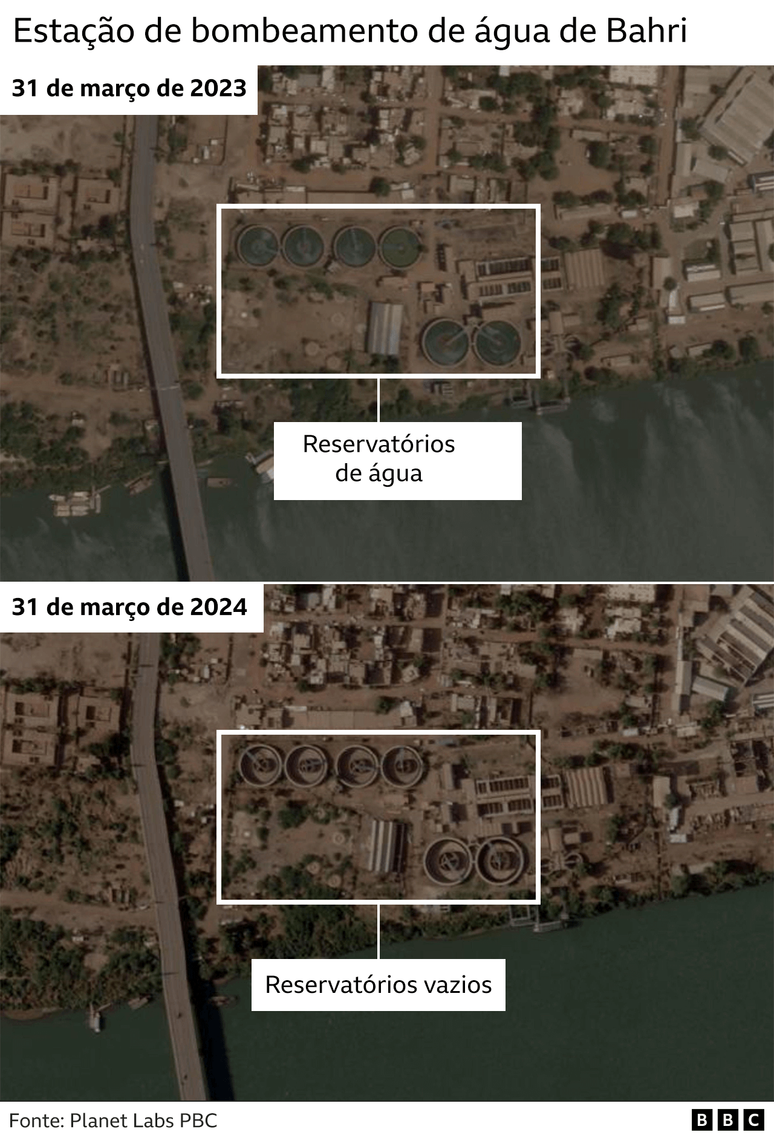
Flights at Khartoum International Airport were suspended early in the war after the airport became a major battlefield, negatively impacting the delivery of humanitarian aid within the country.
BBC Verify has analyzed and classified as authentic several airport videos released in the first 48 hours of the conflict.
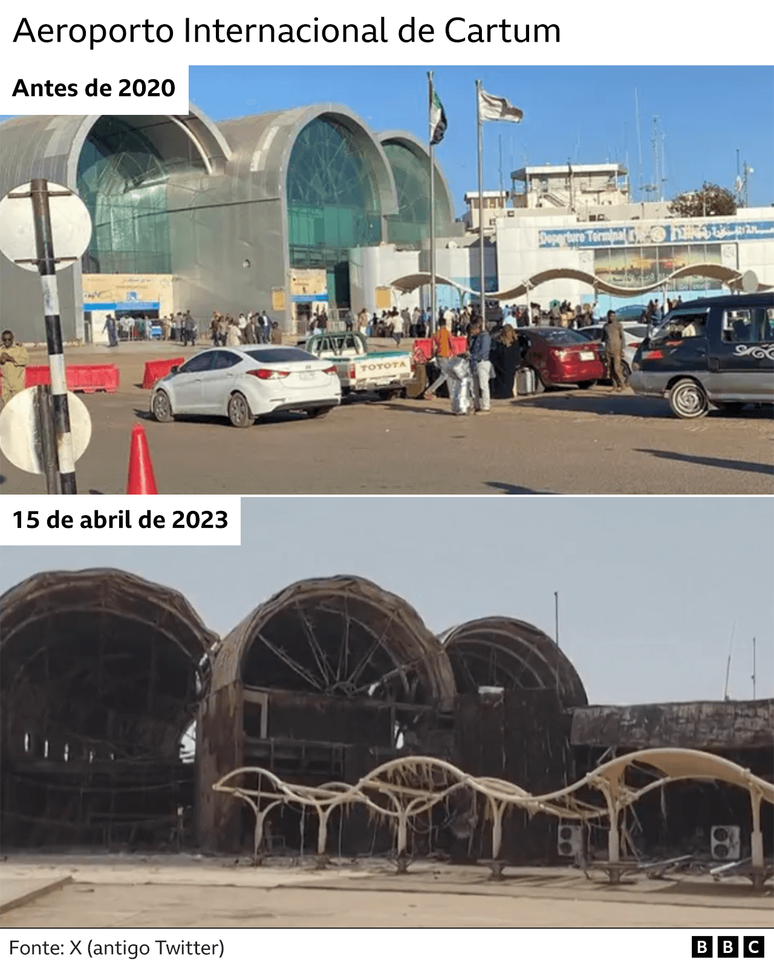
The first video seen by BBC Verify on April 15 was from the northern end of the runway: RSF could be seen running across the runway and firing near the main airport buildings.
Footage from the cockpit of one of the planes at Khartoum International Airport yesterday shows RSF forces firing as they move across the tarmac pic.twitter.com/xWUhS4hHhT
—Benjamin Strick (@BenDoBrown) April 16, 2023
Soon after, thick smoke rose from at least one burning plane at the north end of the runway.
This afternoon a drone camera flew over Khartoum airport! Illustrates the extent of damage to airport facilities and property.#Sudan pic.twitter.com/bBylxCBOnS
— Hassan Hussein | #KeepEyesOnSudan (@HassanAburas) April 15, 2023
Another video showed planes at ground level, probably the same ones burning as the previous video, but this time in the eastern part of the airport.
Management of operating costs pic.twitter.com/3M9XE61I1F
— Gamar Abdulrahim (@Qamaroo3) April 15, 2023
Both the Army and RSF are accused of damaging Khartoum’s vital infrastructure, but both blame each other.
No end in sight
Fighting is also occurring in other parts of Sudan, particularly in western Darfur, which has suffered from violence between African and Arab communities for years.
Recent research by the Center for Information Resilience – a British government-funded research group – found that more than 100 villages in western Sudan have been burned.
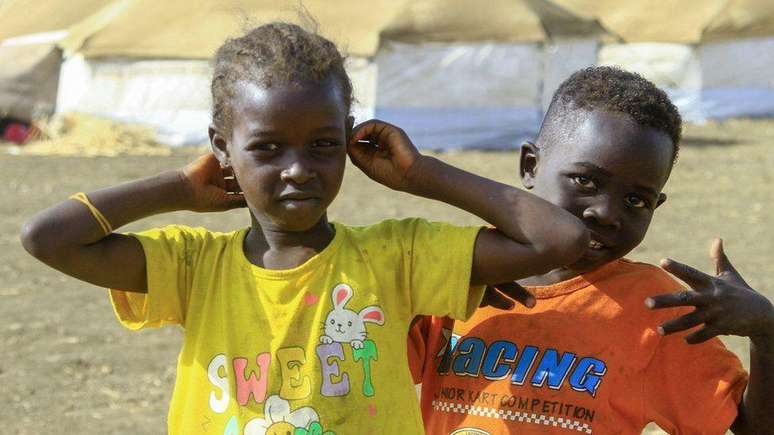
Sudanese economic analyst Wael Fahmy says the effects of the war on the economy and food system have been catastrophic.
“The economy has contracted by 50% and about 60% of agricultural activity has stopped,” he says.
The outlook for the United Nations World Food Program is equally bleak.
“What is happening today in Sudan is an absolute tragedy. We believe it has gone too far,” says Michael Dunford.
Several international attempts to broker a ceasefire have failed, although there is new hope for talks in the Saudi city of Jeddah.
*Additional reporting by Samira Elsaidi and Benedict Garman.
Source: Terra
Rose James is a Gossipify movie and series reviewer known for her in-depth analysis and unique perspective on the latest releases. With a background in film studies, she provides engaging and informative reviews, and keeps readers up to date with industry trends and emerging talents.

